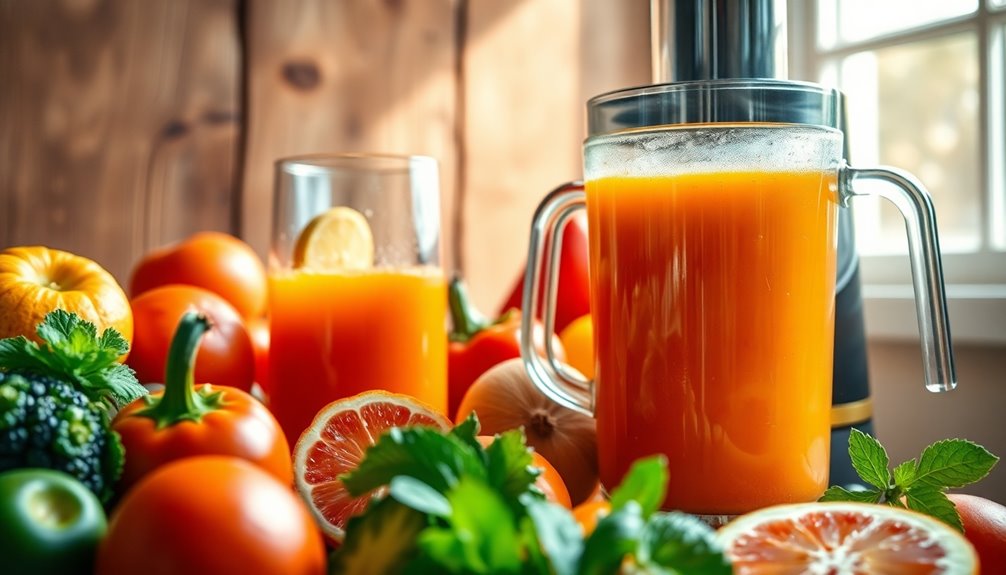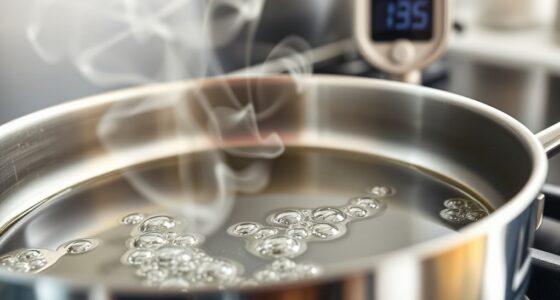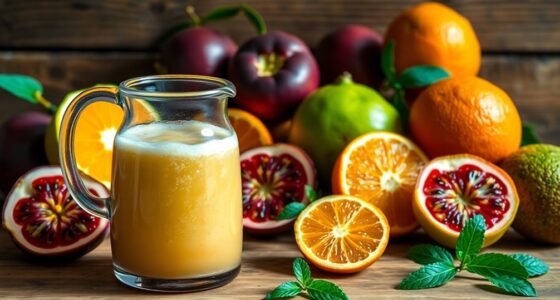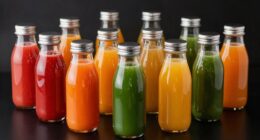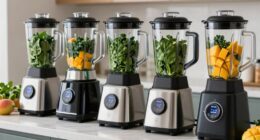Freshly squeezed juice lasts about 2-3 days in your fridge. However, juices like pineapple and lemon can last a bit longer, around 4-5 days. To keep your juice fresh, store it in glass containers with airtight seals, and make sure it stays cold. Room temperature can spoil it quickly. Proper storage is key to enjoying the full flavor and health benefits. If you're curious about other storage tips, there's plenty more to learn!
Key Takeaways
- Freshly squeezed juice typically lasts 2-3 days in the fridge; pineapple and lemon juice can last 4-5 days.
- Properly store juice in glass containers with airtight seals to maximize freshness and prevent spoilage.
- Freezing juice can extend its shelf life to 12-16 months with minimal nutrient loss when done correctly.
- Thawed juice should be consumed within a couple of days and stored in the fridge until ready to drink.
- Always check for off smells or changes in appearance before consuming juice, especially if it has been stored for a while.
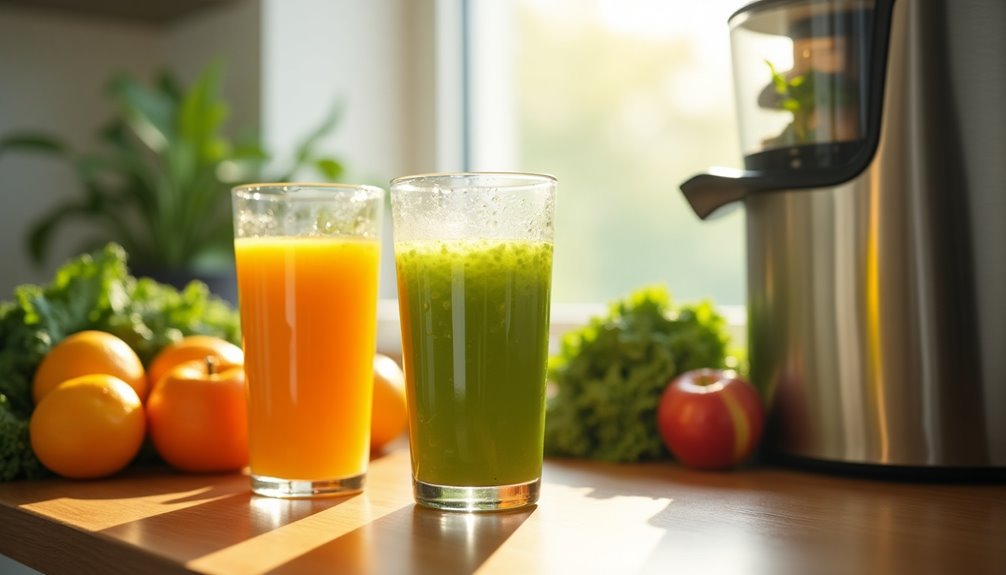
When you're enjoying a refreshing glass of juice, it's important to know how long it stays fresh so you can savor every drop. Freshly squeezed juice, like orange juice, has a limited shelf life. If you store it in the fridge, you can usually enjoy it for about 2-3 days. If you're juicing pineapple or lemon, you're in luck because those can last a bit longer, around 4-5 days in the refrigerator.
However, if you want to keep that juice tasting fresh even longer, you'll need to consider your storage options carefully. Refrigerated juice is your best bet for maintaining its flavor and nutrition. When juice is stored at room temperature, it's prone to spoilage and nutrient loss. Keeping it cold helps retain more vitamins and keeps the juice fresh longer.
If you've made a large batch, using proper storage techniques is essential. Glass containers with airtight seals are ideal for maximizing freshness. They prevent air from getting in, which can lead to oxidation and spoilage.
If you're looking for ways to extend its shelf life even further, freezing is an excellent option. When you freeze fresh juice, it can last anywhere from 12 to 16 months with minimal nutrient loss. Just remember to leave some space in the container, as liquids expand when frozen.
If you want to freeze juice effectively, consider vacuum sealing it. This technology reduces oxidation, keeping your juice fresher for a more extended period. Beet juice is known for its high nitrate content, which can enhance blood flow, making it a great choice for health-conscious juicers.
Once you've frozen your juice, when you're ready to enjoy it, just thaw it in the fridge. Avoid thawing it at room temperature, as this can lead to bacterial growth and spoilage. When thawed, it's best to consume the juice within a couple of days to ensure you're getting the most out of its flavor and nutrients.
While fresh juice is undoubtedly delicious, understanding the factors that affect its shelf life can help you make the most out of your juicing experience. Always prioritize proper storage; it's key to enjoying the full benefits of your juice.
Whether it's orange juice, pineapple, or any other variety, knowing how to store and preserve it makes a big difference.
Frequently Asked Questions
How Long Does Fresh Juice From a Juicer Last?
Fresh juice from a juicer lasts anywhere from a couple of days to over a year, depending on how you store it.
In the fridge, citrus juices typically last 2-3 days, while pineapple and lemon juice can last up to 5 days.
If you freeze it, you can enjoy it for 12-16 months.
To keep it fresh, use airtight glass containers and fill them to the brim to limit air exposure.
How to Preserve Juice After Juicing?
Did you know that vacuum sealing juice can keep it fresher for up to five times longer than regular storage?
To preserve your juice effectively, store it in airtight glass containers. Consider freezing it for 12-16 months to maintain nutrients.
Use opaque containers to shield your juice from light, which can degrade Vitamin C.
Always clean your storage containers beforehand to avoid contamination and ensure your juice stays high-quality for as long as possible.
Do You Have to Drink Juice Immediately After Juicing?
You don't have to drink juice immediately after juicing, but it's best to consume it right away for maximum nutrition.
If you can't enjoy it right away, store it properly in the fridge, ideally in a glass container with an airtight seal. This helps minimize oxidation and keeps the juice fresher for a couple of days.
Just remember, the longer you wait, the more nutrients you might lose. Enjoy your juice!
Can You Drink Juice After 7 Days?
Can you imagine sipping on juice that's been sitting around for over a week? You shouldn't!
After 7 days, fresh juice can become unsafe to drink due to bacterial growth and nutrient loss. It's better to enjoy your juice within 2-5 days, depending on the type.
If you're looking for longevity, consider freezing it.
Always prioritize freshness for the best taste and nutrition—your body will thank you!
Conclusion
In the world of fresh juice, timing is everything. Just like a beautiful flower wilts without water, your juice loses its vibrant nutrients and flavor over time. Ideally, you should drink it within 24 to 72 hours if you store it properly in the fridge. So, savor that liquid sunshine as soon as you can, but don't let it linger too long on the shelf. Your body will thank you for enjoying it fresh!
Cindy thoroughly researches juicing trends, techniques, and recipes to provide readers with practical advice and inspiration. Her writing style is accessible, engaging, and designed to make complex concepts easy to understand. Cindy’s dedication to promoting the advantages of juicing shines through her work, empowering readers to make positive changes in their lives through the simple act of juicing.

